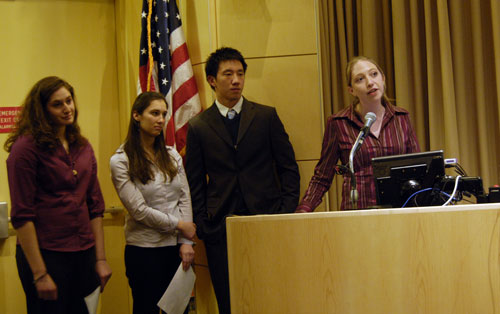IGL Students Explore Millennium Challenge Corporation Goals in Guatemala

|
|
Photograph:The 2008 EPIIC SYMPOSIUM. Left to right, Jackie Silberman, Rachel Brown, David Mok, Kelsi Stine
As a special project derived from the EPIIC 2007-08 theme on "Global Poverty and Inequality," a team of seven undergraduate and graduate students worked with INSPIRE Fellow, Amb. José María "Chema" Argueta to understand how the mission and innovative methodology of the Millennium Challenge Account (MCA) as well as the "MCC Effect" applied to Guatemala as it aspires to qualify for MCA threshold funding.
In addition to substantial library and internet research, the team conducted field research through interviews in Washington, DC at the Guatemalan Embassy, the MCC Headquarters (including with EPIIC alumna Sophie Sahaf), and at the Washington-based Center for Global Development, a prominent NGO that watches the MCC program. The team's research culminated in January with a ten-day trip to Guatemala to interview a wide range of government officials and leaders from the private sector, political parties, civil society and academia. These interviews allowed the students to experience a broad spectrum of Guatemalan perspectives on the issue of extreme poverty in the country.
At the February 2008 EPIIC International Symposium, the Guatemala team delivered a well received presentation on their preliminary findings. The team will be issuing a final paper that will be coming out this month.
Also this month, IGL and several of the team members will be participating in the Inaugural Central American Youth Conference, titled "Leaders of the Present: Youth Leadership and Civic Engagement in Central America," to be held in Antigua, Guatemala, Guatemala's former capital. Two officials from the MCC have been invited to this international conference, which is sponsored by the Project on Justice in Times of Transition (PJTT), the Club of Madrid, FRIDE and DARA. The initiative will bring together youth leaders from Central America countries to formulate national and regional action plans to help give more voice to the younger generation primarily on the key issues of natural disaster relief and gang violence.
With Amb. Argueta, the IGL students are in the process of setting of up a new Institute program to study poverty and power, and under this rubric students from IGL intend to continue studying the efforts of Guatemala to obtain Threshold Funding. The goal is to continue to use the MCC as a lens to look at the developing world to study the relationship between power and poverty. To that effect, several team members have returned to Guatemala this summer. It is envisioned that the student program will produce a series of reports as Guatemala attempts to make its way through the MCC process.
"The Millennium Challenge Corporation gives our students a lens and prism to look at a country in the developing world. It has provided them with a roadmap to assess the different strategic issues impacting development in a country suffering extreme poverty" says Sherman Teichman, Director of the Institute of Global Leadership (IGL).
Amb. Argueta is the Executive Director of the Institute for Central American Strategic Studies and is the former (and first civilian) National Security Adviser of Guatemala and the former Guatemalan Ambassador to Japan and Peru. In Guatemala, Mr. Argueta oversaw and calibrated the ongoing Guatemalan Peace Process and managed relations with the US, European Union, Taiwan, and other Central American countries during his tenure in government. As Guatemalan Ambassador to Peru, he was among the hostages taken at the Japanese Embassy in late 1996 by the Tupac Amaru guerillas. He was among the lead negotiators that helped gain freedom for the hundreds of hostages that were captured for over 126 days in the Japanese Embassy. Mr. Argueta, a board member of the Project on Justice in Times of Transition, also participated in the IGL's 2007 forum on "Iraq: Moving Forward."

